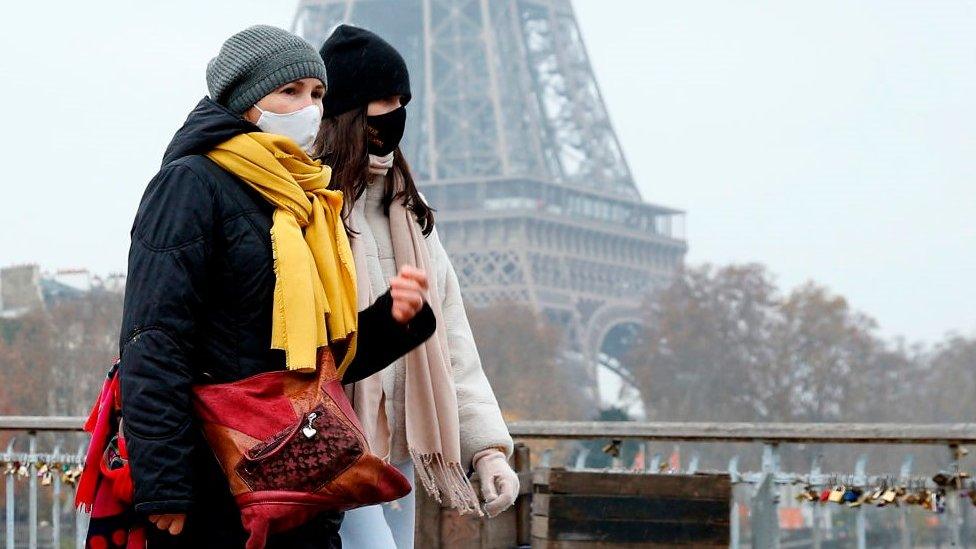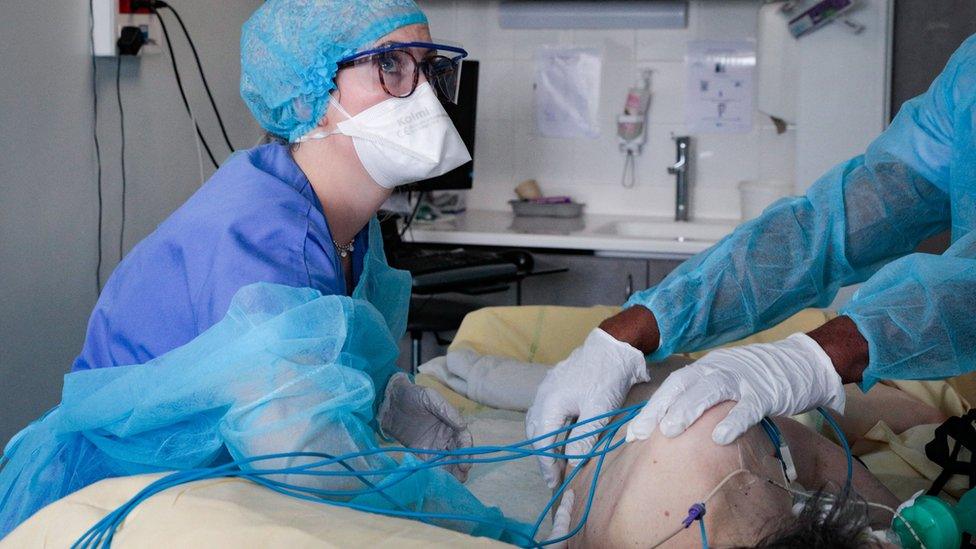Covid: US reports record infections as Europe's Omicron cases also soar
- Published

France reported Europe's highest ever number of new daily cases on Tuesday, with 179,807 infections
The US and several European countries have reported their highest daily rises in Covid cases since the pandemic began, as the Omicron variant spreads.
More than 440,000 new cases were recorded in the US on Monday, health officials said.
France, Italy, Greece, Portugal and England have also reported record numbers of daily infections.
Officials have said the high figures could be due in part to reporting delays over the Christmas period.
Studies suggest that Omicron is milder than the previously dominant Delta variant, but fears remain that the sheer number of cases stemming from the highly infectious Omicron could overwhelm hospitals.
The World Health Organization (WHO) has warned that the risk posed by Omicron "remains very high", external.
Poland on Wednesday recorded 794 Covid-related deaths, the highest number in its fourth wave of the pandemic, with more than three-quarters of the victims unvaccinated.
EXPLAINER: Omicron up to 70% less likely to need hospital care
IN CHARTS: Tracking the pandemic
In the US, cases recorded by the US Centers for Disease Control and Prevention (CDC) rose by 441,278 on 27 December - by far the highest number of daily cases ever reported to the agency.
The CDC data tracker, external says US media report the seven-day average rise in infections is now at its highest level since January 2021.
A CDC spokeswoman told news site Politico, external that the latest infection figures could be overestimated due to lags in testing and test centre closures over the Christmas period, adding that case numbers would "become more stable after the new year".
The health agency has also expanded its travel warnings for parts of Europe, adding Malta, Moldova and Sweden to a list of countries where travel poses a very high risk of infection, external.
Travellers are asked to avoid these countries under the CDC's Level 4 criteria, which a destination receives if it reports more than 500 cases per 100,000 people.
US infectious disease expert Amesh Adalja told the BBC that Omicron could "get round the protection afforded by vaccines" and "affect anybody at will".
"So we are going to see cases rise," he said. "The key is to keep this away from high-risk people... we're really going to have to focus on severe cases and hospitalisations."

Sharon Catron Sharp waits in a long queue for Covid testing in Memphis, Tennessee
According to a report published by the WHO on Tuesday, the number of new Covid infections of all variants grew by 57% in Europe in the week before 26 December, and by 30% in the Americas.
On Tuesday, France reported 179,807 new infections, Europe's highest ever number of daily cases.
French Health Minister Olivier Véran warned that "everything suggests" France could see as many as 250,000 daily cases by the start of January.
The French Hospital Federation has said that the "most difficult weeks are yet to come".
Prime Minister Jean Castex announced new restrictions earlier this week. The country's booster rollout has ramped up, with more than 23 million people having received a booster to date.
A number of other European countries also reported record daily cases on Tuesday:
Infections in Italy topped 78,000 cases, hitting a new record since the start of the pandemic. It also recorded 202 deaths, bringing the total number of deaths in the country to 136,753
Portugal recorded 17,172 new cases
Greece: Health Minister Thanos Plevris called for calm after the country reported 21,657 cases
Health authorities in England reported a record 117,093 cases. Full UK-wide Covid data has been unavailable over the Christmas period
In England, pharmacists are warning of patchy supplies of rapid Covid tests following an increase in demand. They say rule changes - meaning people only have to self-isolate for seven days if they test negative on days six and seven - have led to a shortage of lateral flow tests.
Meanwhile, a number of cities - including Paris, London and Berlin - have cancelled official New Year's celebrations. But some governments have been less willing to bring in nationwide restrictions.
People in France and England have been asked to use their common sense, while the Spanish capital Madrid has said it will go ahead with its celebrations with a cap on the number of attendees at Puerta del Sol square.
Italy, meanwhile, has banned outdoor events and closed nightclubs but there are no restrictions on private gatherings, external.
Omicron and boosters: Your questions answered
- Published28 December 2021

- Published28 December 2021

- Published28 December 2021

- Published27 December 2021
